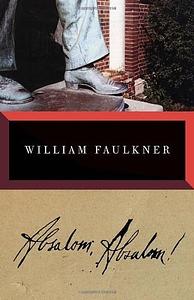Take a photo of a barcode or cover
challenging
dark
tense
medium-paced
Plot or Character Driven:
A mix
Strong character development:
No
Loveable characters:
No
Diverse cast of characters:
No
Flaws of characters a main focus:
Yes
Though this would be my least favorite Faulkner novel I’ve read so far (as the rating suggests, I still really liked it), it might be the clearest statement of his core themes. Absalom Absalom is the story of a man undone and destroyed by his inability to see beyond his society’s byzantine racial structure and baroque conceptions of “honor” and “tradition.” Everyone here is haunted and doomed — including the narrator, as you know if you’ve read The Sound and the Fury. Absalom Absalom draws obvious parallels to that book, but also differs quite a bit in approach. In that book, Faulkner really put us into the heads of the different Compson narrators, employing language that mimicked the odd rhythms of human thought. We don’t get that variation in narrative voice here, even though the story is being “told” by different storytellers, usually in conversations with Quentin Compson that can sometimes feel like Socratic dialogues. The whole book has the feeling of a ghost story being told around a campfire, one that combines myth and apocryphal detail with an earnest excavation of the past. And like any good ghost story, even one authored by a writer as dense and challenging as Faulkner, Absalom Absalom manages some “plot reveals” that can make you gasp and shudder.
challenging
dark
mysterious
sad
slow-paced
Plot or Character Driven:
Character
Strong character development:
Complicated
Loveable characters:
No
Diverse cast of characters:
Yes
Flaws of characters a main focus:
Yes
I could have never made it through this book without listening to it on audio. Faulkner has weird writing style where he likes to make one sentence take up a whole page and that makes this book complicating for me to read. I will admit that the storyline was intriguing and the plot twist totally caught me off guard. The only reason I chose to give it a three is because of my opinion of the writing style and how I felt like details were overly repeated throughout the novel. Overall I liked the story line though.
Faulkner’s almost impenetrable, untameable wave of suffocating cadence rolls unrelentingly toward shore, only to backwash and gather itself again—another thunderclap from vantages new, another fractured echo from the pen of this alien talent, this inimitable genius. It’s a story of the South, one that begins as a whisper in a dark, airless room and unfolds into a sprawling, fragmented gothic tragedy—of violence, of vaulting ambition, and of a ghost from the past come to crush a dynasty.
A man: Thomas Sutpen. Devil incarnate. Demon. Arriving in 1833 Mississippi with two pistols and a horse and a plan—his design—a hundred-square-mile plot of prime virgin land bought with Spanish gold. A life dragged up from the swamp with Haitian slaves with a cold, calculated, unsettling single-mindedness. Quite simply, one of the best books I’ve ever read.
I can’t stop thinking about it. It got under my skin from the first chapter and lodged itself there, growing heavier the longer I stayed. Yes, it’s the story of Sutpen—but it’s also the story of the telling. The story as shape-shifter. A tale passed down and passed around, bent and broken and built anew. From that dim, suffocating Southern parlor to a cold dormitory in Harvard, voices speak over one another, invent, imagine, remember, forget. Details are added, omitted, embellished. The story evolves in the telling until it becomes what we hold in our hands—Absalom, Absalom! The truth doesn’t necessarily make a great story. Only an accurate one.
And then there’s Quentin Compson. Not suffering quite so much as in The Sound and the Fury, but still—still that weight, still that burden. The South pressing down on him like a curse. A grim fable thrust upon him, and one he helps to finish. The telling marks him. Haunts him. Faulkner really did love to put that poor kid through the wringer.
A man: Thomas Sutpen. Devil incarnate. Demon. Arriving in 1833 Mississippi with two pistols and a horse and a plan—his design—a hundred-square-mile plot of prime virgin land bought with Spanish gold. A life dragged up from the swamp with Haitian slaves with a cold, calculated, unsettling single-mindedness. Quite simply, one of the best books I’ve ever read.
I can’t stop thinking about it. It got under my skin from the first chapter and lodged itself there, growing heavier the longer I stayed. Yes, it’s the story of Sutpen—but it’s also the story of the telling. The story as shape-shifter. A tale passed down and passed around, bent and broken and built anew. From that dim, suffocating Southern parlor to a cold dormitory in Harvard, voices speak over one another, invent, imagine, remember, forget. Details are added, omitted, embellished. The story evolves in the telling until it becomes what we hold in our hands—Absalom, Absalom! The truth doesn’t necessarily make a great story. Only an accurate one.
And then there’s Quentin Compson. Not suffering quite so much as in The Sound and the Fury, but still—still that weight, still that burden. The South pressing down on him like a curse. A grim fable thrust upon him, and one he helps to finish. The telling marks him. Haunts him. Faulkner really did love to put that poor kid through the wringer.
"Tell about the South. What's it like there. What do they do there. Why do they live there. Why do they live at all.”
Our social systems (in particular capitalism) are such that some qualities such as bravery, courage, hard work, physical strength, cunning, intelligence etc are rewarded while others the softer ones like compassion, kindness, honesty etc not only remain unrewarded but also come with a price for one of who possess them. In fact, only incentives, besides a clear conscience (which is a hardly a thing to bother about), are other-worldly, that is, those promised by religions in afterlife. Now in such a society, people will be discouraged (like Thomas Sutpen) to hold onto those softer qualities - unless they have a really strong conscience, and thus we have a society which is liable to doom. Nietzsche was critical of soft qualities but Faulkner thinks it is lack of soft qualities which brought the failure of Southern States. The story of Sutpens is an allegory to effect.
Another reason is medivel sense of honor. With the need for a son to continue one's family name,sense of racial purity not allowing them to marry people of color or their children, the fact that they consider themselves disgraced if one of them was to be found homosexual or if one of their women was to lose virginity (worse still get pregnant) before marriage - their sense of honor was something highly vulnerable and insecure. Of course, a lot of this is still true most regions in India.
Now all this is interesting, and there is some lovely prose - after all, it is written by Faulkner. The problem is, well, it is written by Faulkner. Faulkner might disagree with Nietzsche on importance of soft values, but he is in complete agreement about something else later said: “I obviously do everything to be "hard to understand" myself”
The first sentence for example contains 122 words. And it is not an exception, the exclamation sign in title is a warning. This book holds Guinness book of world record (I'm not kidding) for longest sentence in all literature - 1288 words. And the sentence is still incomplete.
There are more of these Faulknerisms. The same story is told by different narrators focusing on different aspects, and they are all biased and often end up in speculations, in fact much of it is speculation by people who had little, or in one case nothing to do with characters. There are times when you don't know who is talking and times when you don't know who is being talked about. Names are given without introduction. And, no offence, but if people in South spoke in sentences as long as they did in this book, they deserved to lose the war.
There are repitations too - like in The Sound and The Fury, there is an example of two brothers in love for their sister.
Telling of story by different narrators is though not without merit. One thing it shows how true stories can never be told given bias of narrators ( a perfect theme for someone like Faulkner to write about) and, also how a listener modifies story for his/her own benifit in retellings but, most importantly, it shows how stories in turn affect their listeners. Quentin's (the same character from The Sound and The Fury) disillusionment with Southern values. And it was a sort of turning point in his life. At first he believed and was proud of Southern values, however, if those values for so perfect, Thomas Sutpen or South should never have failed. It is only by thinking about Sutpen's story that he is able to discover the truth. And by the end, he is struggling not to hate the South.
“I dont hate it he thought, panting in the cold air, the iron New England dark; I dont. I dont! I dont hate it! I dont hate it!”
challenging
dark
tense
slow-paced
Plot or Character Driven:
A mix
Loveable characters:
No
dark
tense
Faulkner's greatest novel. Which means it is in contention for the greatest novel ever penned. Read it
slow-paced
challenging
dark
slow-paced
Plot or Character Driven:
Character
Strong character development:
Yes
Loveable characters:
No
Diverse cast of characters:
No
Flaws of characters a main focus:
Yes




